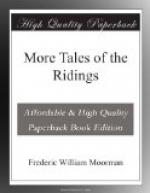“Efter that I fair lost count o’ t’ time. I sat theer, lapped i’ my shawl, an’ glowered at Janet, an’ t’ sun, an’ t’ watterfall, while at lang length I heerd soombody callin’ me. ‘Twere my father, an’ then I knew that fowks had missed me up at t’ farm an’ were seekin’ me amang t’ crofts. Wi’ that I gat up an’ ran same as if I’d bin a rabbit; an’ theer were my father, stood on t’ brig betwixt our house an’ t’ cove, shoutin’ ‘Martha!’ as loud as iver he could.”
“Did he give thee a hazelin’ for bidin’ out so late?” asked Kester, with a wealth of personal experience to draw upon.
Grannie was somewhat taken aback by the pertinent question, but she was too clever to give herself away. “What’s that thou says about a hazelin’, Kester? Look at t’ clock. It’s time thou was gettin’ alang home, or mebbe there will be a hazelin’ for thee.”
The Potato and the Pig
A Fable for Allotment-Holders
Abe Ingham was a Horsforth allotment-holder. He talked allotments all day and dreamed of them all night. Before the war cricket had been his hobby, and he was a familiar figure at County and Council matches for twelve miles round. Now he never mentioned the game; he had exchanged old gods for new, and his homage was no longer paid to George Hirst or Wilfred Rhodes, but to Arran Chief, Yorkshire Hero, and Ailsa Craig. He took his gardening very seriously, and called it “feightin’ t’ Germans.” If you asked him when the war would be won he pleaded ignorance; but if you asked him where it would be won, his answer invariably was: “On t’ tatie-patches at Horsforth.” He still nursed his grievances, for pet grievances are not yet included in the tax on luxuries, but these were no longer suffragettes and lawyers, but slugs, “mawks,” and “mowdiewarps.” In a word, Ingham was one of the many Englishmen whom four years of war conditions have re-created. He was slimmer and more agile than in 1914, and of the “owd Abe” of pre-war times all that remained was his love of tall stories. I was privileged to listen to one of the tallest of these one evening, after he had paid a visit of inspection to my garden and was smoking a pipe with me under my lime-tree.
“Fowks tell queer tales ’bout ’lotments,” he began, “but I reckon they’re nobbut blether anent t’ tale that I could tell o’ what happened me last yeer.”
“What was that, Abe?” I asked. “Did you find a magpie’s nest in your Jerusalem artichokes or half-crowns in the hearts of your pickling cabbages?”
“None o’ your fleerin’,” he replied. “What I’m tellin’ you is t’ truth, or if it isn’t’ truth it’s a parable, and I reckon a parable’s Bible truth. It were gettin’ on towards back-end, and I’d bin diggin’ potatoes while I were in a fair sweat wi’ t’ heat. So I reckoned I’d just sit down for a bit on t’ bench I’d made an’ rest misen. Efter a while I gat agate once more, an’ I’d ommost finished my row of potates when my fork gat howd o’ summat big. At first I thowt it were happen a gert stone that I’d left i’ t’ grund, but it were nowt o’ sort. ’Twere a potate, sure enough, but I’d niver set eyes on owt like it afore, nor thee either. ’Twere bigger nor my heead; nay, ’twere bigger nor a fooit-ball.”




